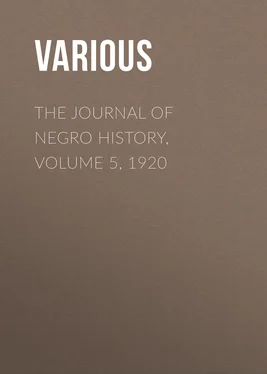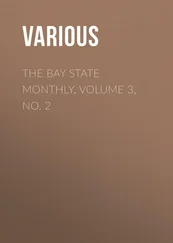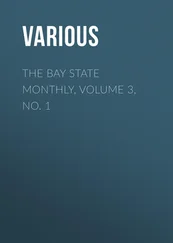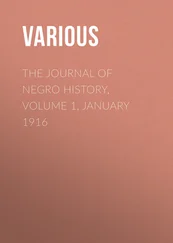Various - The Journal of Negro History, Volume 5, 1920
Здесь есть возможность читать онлайн «Various - The Journal of Negro History, Volume 5, 1920» — ознакомительный отрывок электронной книги совершенно бесплатно, а после прочтения отрывка купить полную версию. В некоторых случаях можно слушать аудио, скачать через торрент в формате fb2 и присутствует краткое содержание. Жанр: foreign_antique, periodic, История, foreign_edu, на английском языке. Описание произведения, (предисловие) а так же отзывы посетителей доступны на портале библиотеки ЛибКат.
- Название:The Journal of Negro History, Volume 5, 1920
- Автор:
- Жанр:
- Год:неизвестен
- ISBN:нет данных
- Рейтинг книги:4 / 5. Голосов: 1
-
Избранное:Добавить в избранное
- Отзывы:
-
Ваша оценка:
- 80
- 1
- 2
- 3
- 4
- 5
The Journal of Negro History, Volume 5, 1920: краткое содержание, описание и аннотация
Предлагаем к чтению аннотацию, описание, краткое содержание или предисловие (зависит от того, что написал сам автор книги «The Journal of Negro History, Volume 5, 1920»). Если вы не нашли необходимую информацию о книге — напишите в комментариях, мы постараемся отыскать её.
The Journal of Negro History, Volume 5, 1920 — читать онлайн ознакомительный отрывок
Ниже представлен текст книги, разбитый по страницам. Система сохранения места последней прочитанной страницы, позволяет с удобством читать онлайн бесплатно книгу «The Journal of Negro History, Volume 5, 1920», без необходимости каждый раз заново искать на чём Вы остановились. Поставьте закладку, и сможете в любой момент перейти на страницу, на которой закончили чтение.
Интервал:
Закладка:
Stephen A. Swails—
Delegate to the State Constitutional Convention.
Represented Williamsburg Co., in the Senate.
Elected President pro term of the Senate for the whole period.
A very strong character and exerted considerable influence in legislation.
Was in the 54th Massachusetts Infantry.
Had musical talent of a high order.
Judge Lee—
Judge of the Municipal Court of Charleston, S. C.
A man of ripe scholarship and of high legal attainments.
Until President Roosevelt appointed Judge R. H. Terrell of Washington to a similar position, I think he was the only colored man who ever occupied such a position.
Francis L. Cardozo—
Born in South Carolina, at Charleston.
Educated in Scotland, at Glasgow University.
Delegate to the State Constitutional Convention.
Secretary of State for four years.
State Treasurer for two years.
Scholarly, courtly and dignified.
Took great interest in the education of the colored youth, and was popular among the boys on account of the fatherly interest he manifested in them.
Moved to Washington, D. C., after 1876 and accepted a position in the office of the Auditor for the Post Office Department.
After serving for several years in the Department he was elected to the Principalship of the Colored High School in Washington, a position he filled with honor and credit to the race and himself. After his death the Board of Education named one of the School Buildings the "Cardozo Building" as a tribute to his great interest in the educational welfare of the colored race.
Henry E. Hayne—
Born in South Carolina.
Delegate to the State Constitutional Convention.
State Senator from Marion, Co.
Secretary of State.
Was very much interested in the education of the colored youth.
Richard H. Gleaves—
Served two terms as Lieutenant Governor.
Elected with Gov. F. J. Moses in 1872 and with Gov. D. H. Chamberlin in 1874.
Was nominated a third time with Gov. Chamberlin and elected but forced by the Democrats to withdraw.
Henry W. Purvis—
Born in Philadelphia, Pa.
Son of Hon. Robert Purvis, the great Abolitionist. Member, house of Representatives, 1868-1870, and then was Adjutant General.
Was Adjutant General of the State most of the Reconstruction Period.
He was a man without fear.
In the campaign of 1876 he went to Edgefield, the homes of Generals Butler and Gary, the Democratic leaders, and regarded as fire eaters and spoke on the campaign issues. He also went to other parts of the State equally as dangerous and filled his engagements.
J. J. Wright—
Delegate to the State Constitutional Convention.
On account of his great legal ability he was elected by the legislature as an Associate Justice of the Supreme Court of the State. (There were two Associate Justices.) He had the respect of the entire Bar of the State.
He was pre-eminently fitted for the position.
He is the only colored man who has ever occupied such an exalted judicial position in this country.
Thomas E. Miller—
Born at Ferrybeeville, Beaufort Co., June 17, 1849.
Attended the free public school for Negro youths up to the breaking out of the war.
Graduated from Lincoln University, Pennsylvania, in 1872.
Read law under Judge P. L. Wiggin and Chief Justice Moses of South Carolina and was admitted to the Supreme Court of S. C. in 1875.
Elected to the House of Representatives of S. C., 1874-1876-1878.
Elected Senator from Beaufort Co., 1880.
Elected to the 51st Congress.
Elected to the House of Representatives of S. C., in 1866, and while serving was instrumental in having the "State College for Colored Youth" established at Orangeburg, S. C., and on that account was elected its first President.
Dr. B. A. Bosemon—
Born at Troy, N. Y.
Delegate to the State Constitutional Convention. Member of the House of Representatives of S. C. Appointed Postmaster at Charleston, S. C., by President Grant and served four years with entire satisfaction to the people of that city with honor and credit to himself and the race.
Suave and polished he had a pleasing personality.
He had quite a large and lucrative practice in his profession.
Charles McDuffie Wilder—
Born in South Carolina. Delegate to the State Constitutional Convention.
Member of the House of Representatives of S. C. Member of the City Council of Columbia, S. C.
Postmaster at Columbia, S. C. for sixteen years. Appointed by President Grant two terms and one term each by Presidents Garfield and Hayes.
There were two white applicants for the position after President Garfield was inaugurated and Postmaster General James, who was supposed to be friendly with one of them, sent a Post Office Inspector to Columbia to find out the sentiment of the business men. They were almost unanimously for Mr. Wilder. They stated that he had served them efficiently for eight years and did not approve of a change.
Generals Hampton and Butler represented the State in the U. S. Senate at the time, Columbia being Senator Hampton's home and had he objected Senatorial courtesy would have sustained him.
It shows in what estimation Mr. Wilder was held by his home people.
Mr. Wilder's appointment of four successive terms to a first-class post office is a record.
Mr. Wilder was a delegate to all of the National Republican Conventions up to and including that of 1888.
Mr. Wilder was a man of good sound judgment, of great political force and one of the few who had anything to show after the political upheaval of 1876.
Samuel J. Lee—of Aiken, S. C.
Born in South Carolina.
Member of the House of Representatives of S. C.
Speaker of the House of Representatives for one term.
A lawyer of recognized ability.
An expert in parliamentary procedure.
A man of engaging address, of a genial disposition, a pleasing speaker, he was the most popular presiding officer of that period.
D. Augustus Straker—
A prominent member of the House of Representatives during the latter part of the Reconstruction Period.
A man of brilliant parts and one of the leading lawyers of the State.
Moved to Detroit, Mich., after the collapse in 1876, and played quite an active and conspicuous part in politics there.
William J. Whipper—
Born in South Carolina.
Delegate to the State Constitutional Convention.
Member of the House of Representatives of S. C.
A man of splendid legal talent.
Elected by the legislature a Circuit Court Judge but Gov. Chamberlain refused to commission him, (Ex. Gov. Moses, white, was elected a Circuit Court Judge at the same time and he was also refused a commission by Gov. Chamberlin.)
Judge of Probate of Beaufort Co., for more than ten years.
Prince Rivers—
Born in South Carolina.
Delegate to the State Constitutional Convention.
Member of the House of Representatives of S. C.
Brigadier General in the South Carolina Militia.
Called the "black Prince" and he looked it with his fine physique and military bearing as he rode at the head of the colored troops as they passed in review before the Governor at their annual inspection.
John Lee—
Born at Columbia, S. C.
State Senator from Chester Co.
Postmaster at Chester.
Self educated.
Very prominent in his county.
W. J. McKinlay—
Born at Charleston, S. C.
Delegate to the State Constitutional Convention.
One of the most prominent colored men in Charleston Co., and one of the most influential in the Party Councils.
Member of the House of Representatives 1868 and part of 1869. Resigned to accept position of Register of Mesne Conveyances, a very important office which he held for several years.
Читать дальшеИнтервал:
Закладка:
Похожие книги на «The Journal of Negro History, Volume 5, 1920»
Представляем Вашему вниманию похожие книги на «The Journal of Negro History, Volume 5, 1920» списком для выбора. Мы отобрали схожую по названию и смыслу литературу в надежде предоставить читателям больше вариантов отыскать новые, интересные, ещё непрочитанные произведения.
Обсуждение, отзывы о книге «The Journal of Negro History, Volume 5, 1920» и просто собственные мнения читателей. Оставьте ваши комментарии, напишите, что Вы думаете о произведении, его смысле или главных героях. Укажите что конкретно понравилось, а что нет, и почему Вы так считаете.












